The 'no experience' developer resume: a step-by-step guide (with templates)
When you're looking for your first job in a new career, having the right resume can be the difference between landing your dream role, or not even getting to speak to the company.
But how do you get taken seriously (and make yourself look good!) when you're just trying to break into an industry?
This guide will give you a detailed, section-by-section walkthrough of how to write your first developer resume . It will cover what to include, what to leave out, and how to structure each section.
It's aimed at new software developers without professional experience, and especially those changing career from a non-traditional background.

🔗 In this guide
- What does your resume need to do?
- Who does your resume need to convince?
- General resume best practices
- Main sections to include
- What NOT to include
- Free resume templates
🔗 What does your resume need to do?
The purpose of your resume is to represent you before you interact with a company in person . And you often have just a few seconds to make a good first impression.
So what does this mean?
Your resume needs to showcase your skills in a clear, scannable and visually appealing way. When you have no experience, there are several key techniques you can use to draw attention to the most relevant information (while staying honest about your background).
So, your resume is not solely responsible for getting you hired, but it does need to get you through that first stage of the process.
🔗 Who does your resume need to convince?
The initial point of contact for your resume might be an online jobs page (which I wouldn't recommend; more on that later), a recruiter who you've connected with on LinkedIn, or a hiring manager while they decide whether to move you forward in their interview process.
These different audiences will be looking for different things.
🔗 Online jobs portals
These are sites like Indeed, or the jobs pages of companies using systems like Greenhouse or Lever.
These portals often have automated screening of resumes that are uploaded. They look for relevant keywords, and could determine whether your resume even gets seen by a human. So, including the right keywords in a machine-readable format is important here.
Pro tip: If you save your resume as a PDF, make sure you can select the text with your mouse—this means it will be readable by automated systems too.
🔗 Recruiters
Unless it's a very small company, your resume will usually be reviewed first by a recruiter. They will be scanning it for relevant keywords and experience to determine whether you're a possible candidate for the position.
Unlike machines, recruiters will also likely base their decision on how professional your resume looks, so this is where clarity, layout and overall design are important.
🔗 Hiring managers
If you pass the recruiter screen, your resume will make its way to a hiring manager. This person will likely have an engineering background, and therefore more technical knowledge, so will be looking for more than just keywords.
This is where explanations of your projects and experience come into play. Hiring managers will want to know not only what tools and technologies you've used, but how—and why you used those specific ones.
🔗 General resume best practices
- Keep it to 1 page. When you have no professional experience, you don't have enough content to justify a longer resume. Anything you might put on a second page is likely not relevant to the role you're applying for.
- Put the most relevant content first. This goes for overall structure, and for the content within each section. For example, if you don't have relevant education, don't put your education at the top—put your (relevant) skills or projects first. Then inside each section, list items in reverse chronological order. This means your employment section should list your most recent job first, and so on.
- Double check for errors. You would be surprised how many professional resumes contain basic spelling or grammatical errors, inconsistent capitalization, or typos. If this kind of thing isn't your strong suit, get a friend to proofread your resume for you. One or two mistakes probably won't cost you a job, but it doesn't give a good impression of your attention to detail.
- Keep the design modern but professional. One or two accent colors is fine, but no more than that. Stick to readable fonts in legible font sizes. Use obvious headings and leave some white space for breathing room (if you cram the page with tiny text, it won't be easily digestible).
- Format it as a PDF. This ensures a consistent layout for anyone viewing your resume. Text files (like .doc or .docx) render differently in different programs, so you risk your formatting looking broken for other people if you use them.
- Consider using a template. Not everyone is a designer, but luckily anyone can get a good-looking resume by using a template. There are hundreds of free options available online, that can be edited in Google Docs and exported to PDF.
🔗 Main sections to include
This is the core structure of a 'no experience' career-changer resume:
- Header section
Let's look at each section in more detail.
🔗 Header section
This is the section at the top of your resume which shows things like your name, contact details, and social links. It's often boldly formatted to stand out and grab attention.
It should include:
- Name. This should be the name you are known by, and would like to be called.
- Job title. Something simple like 'Software Engineer' is best, but you can be more specific, e.g. 'Front-End Developer' if you know you want to specialize in a particular area. It doesn't matter if you haven't had this as an actual job title yet. Avoid words like 'junior' because this could be interpreted negatively before the reader even gets to the rest of the content—let them figure that out for themselves.
- Phone number and email. This is the only information a company should need to get in touch with you. Make sure they're both accurate, and use a professional-sounding email. Gmail is fine, but ideally your email address features your name, and isn't something like '[email protected]'.
- Social links. Stick to relevant ones—developers should generally include GitHub, LinkedIn, and your personal blog/portfolio/website if you have one. A portfolio site can be a great way to show off your skills, particularly if you're a front-end developer.
- Citizenship/work authorization. If your resume implies you're an international candidate (e.g. you list jobs or education from abroad), it can help to mention if you are authorized to work in the country where you're applying for jobs.
🔗 Optional extra: profile
Your header area could also include a profile, overview or objective paragraph.
It's not required, but you can add it if you have space, or a template that includes one. It's basically a sentence or two to summarize who you are and what you're looking for. Keep it short, and use it to draw attention to one or two specific points .
Because you have no experience, you should focus on your enthusiasm, willingness to learn, and what direction you hope to take your career (you can also include any interesting relevant experience you do have).
Pro tip: Avoid generic descriptors like 'results-driven', 'detail-oriented' or 'passionate' without qualifying examples. Anyone can claim these things, so they are meaningless if you don't also demonstrate how they actually apply to you.
Some examples of profile statements that show specific interests and direction:
Motivated software engineer with a background in journalism. Seeking a role in a fast-paced startup where I can continue to develop my backend engineering skills using Python and Go.
Front-end developer with 7+ years of design agency management experience. Looking to grow my technical skill set with the goal of making use of my senior leadership abilities in future.
JavaScript developer with a track record of open source contributions. I'm looking to join a company with a strong open source culture so I can continue to give back to the community.
This section is where you list the skills you've learned that are relevant to your future job as a developer . Most people list technologies here (programming languages, frameworks etc.) but I also like to include things like any agile methodologies I've used, or collaboration skills like pair programming or reviewing other developers' code.
This section is actually optional, but I recommend including it as it's a good way to communicate your experience to the reader in a format they can digest easily—even if they're just quickly skimming your resume.
If you do include this section, keep it focused (don't include too many skills) and be sure to group skills in ways that make sense . For example, if you're looking for a full-stack role, you might list technical skills arranged by stack area (so into front- and back-end sections). If you're just focused on the back end, you might have separate sections for programming langages, frameworks and databases.
🔗 How to present skills on a resume
Skills often work well as a more graphically interesting section on your resume. Simple bullet points are fine, but many resume designs display skills in a table or pill/chip format.
You'll also notice that a lot of templates include skill charts or star ratings for skills, the idea being that you can grade yourself based on your proficiency in each skill. These might be pretty, but I actually don't recommend using them, for the following reasons:
- They're ambiguous. What are these bars relative to? What does each rating mean? How does a 4 out of 5 star rating for CSS with no other context show anyone that you have the ability to do the job?
- Many skills can't be compared equally. Say you want to list, as I mentioned above, a skill like pair programming. Are you better or worse at this than at JavaScript? They're so different that it doesn't even make sense to ask that question.
- There's no proof or validation. People are bad at estimating how proficient they are at things. Describing a real example of how you applied the skill would be more informative (and let the reader decide for themselves whether your skill level is enough) than giving yourself an arbitrary chart rating.
🔗 Experience
This section should be the main focus of your resume. It's where all the most interesting and unique information goes, and is your chance to add the kind of detail that's going to make you stand out.
I use the title 'Experience' rather than 'Employment' deliberately. As a self-taught career changer, you might not have had a job yet, but you can (and should) use this section to showcase all the relevant experience you do have.
So what can you include here?
- Projects. If you know how to code at all (which hopefully you do if you're at the stage of applying for jobs), list your most interesting personal projects here. It's great if you can tell a story with each one: why you built this project (what problem it solves), how you approached it, which technologies you used, and why you chose those ones in particular to solve the problem.
- Open source contributions. This is one of the best ways to get 'real' experience when you haven't had a job. There many large open source projects all looking for new contributors, and it's a great way to work with experienced professional developers, on mature codebases, that operate just like the kind of projects you might work on when you land your first job.
- Freelance work. Another great way to get experience as a new developer is to take on a few small freelance projects. Maybe you had a family member with a small business who wanted a tool or website, or perhaps you found some projects through a freelancing site like Upwork . This type of work isn't usually well paid, but it can be worth it when you're just starting out because it's real experience you can list here.
- Hackathons. You might have participated in events like hackathons or coding challenges, and often this means collaborating in small groups. That's all valuable, relevant experience you can absolutely put on your resume.
If you don't feel like you have enough experience to even fill out this section, I would recommend trying to do some more of these types of projects before applying for a job. You'll have a much easier time getting someone to hire you once you have at least some way to demonstrate you can do the job.
🔗 How to present experience on a resume
To keep the information digestible, use clear headings and short, snappy bullet points rather than walls of text.
The basic structure of each experience entry should be:
- Role, Title or Project Name
- Date (range or single month)
- Description
- Bullet points with extra detail
Here are some examples of how the first three items could look:
🔗 Open Source Contributor, [Name of Project]
June 2020 - present Contributed several bugfixes which led to an improved user experience by... [add more detail about what you did]
🔗 Participant, [Name of Hackathon]
May 2020 Working in a team of 4, we created an app... [describe what your app did and what role you played]
🔗 Personal Project: CoffeeWalks
January 2020 Built a React Native app to guide me on walks around new cities, ensuring I pass at least one coffee shop en route.
If you completed multiple freelance projects, you could group these all together under one 'role' like this:
🔗 Freelance Front-End Developer
Web Design & Development, Joe's Pizza June 2020 Created a new website for this small business to replace an outdated design.
Website Development, Stem & Petal February 2020 Developed a responsive, image-heavy website using React for a local florist.
Blog Development, Prism Marketing November 2019 Added a blog to this marketing agency's website using WordPress.
For each entry, you then want to add a few bullet points going into more detail. Don't just say what you did, but talk about the impact , outcomes and reasons for your choices.
Another way to think about this is every time you state something you did, explain more by answering the question: so what?
For example, this:
Wrote unit tests using the Jest framework.
...is not as good as this:
Introduced unit testing with the Jest framework, which reduced the need for manual testing, saving around 2 hours per week.
Pro tip: Consider introducing some more advanced concepts in your projects like testing, monitoring and performance (and then mention them in your resume). Most people with no experience don't do this, so it will make you come across a lot more professional than the average entry-level candidate.
If you're wondering whether to write your bullet points in the first or third person, it honestly doesn't matter. I've seen both. It's not necessary for a tech resume to sound super formal, so just pick whichever you prefer and be consistent.
🔗 Where to put previous career experience
If you're changing career, you might have several years of employment experience that you don't know what to do with. Do you just list it in with your tech experience? Should you even include it at all?
This depends on how relevant the work is. If you've had roles where you dabbled in something technical, like basic coding or SQL or data analysis, I'd include it for sure (talking up anything that sounds particularly relevant to your new career, of course).
If your past experience is not at all relevant to software development, I'd group it under a single entry at the bottom of your experience section. Say you had a few jobs in fast food restaurants over several years, that single entry could look like this:
🔗 Fast Food Worker
June 2017 - May 2020 Maintained high standards of customer service across various roles in the food service industry, before retraining as a software developer.
🔗 Education
I put this section last for a reason. If you're a new grad with a CS degree, you probably want to put this at or near the top or your resume. But as a self-taught career changer or bootcamp grad, your practical experience will be more valuable than your education in your job search.
Although it might be at the bottom of your resume, this section is still important, particularly because you likely at least have some relevant education—even if not a STEM degree.
So what should you put here?
- Any degree(s) you do have. Even if you studied something completely non-technical, degrees you earned are still a part of your professional journey. Completing a degree also shows that you have skills beyond just the specific content you covered.
- A bootcamp (if you did one). This has been a subject of some debate since the coding bootcamp boom, with some people even suggesting bootcamps could have a negative impact on a resume. Personally, I don't advise trying to hide your bootcamp, but don't expect it to carry any pedigree either—the value of a bootcamp is in the skills you learned, not the fact you attended.
- Relevant online courses. These can show you're dedicated to and capable of learning technical subjects via self-study (an important skill for software developers ), particularly if you've completed some of the more academic ones from platforms like Coursera and edX.
🔗 What NOT to include
With just a single page to work with, you need to use space efficiently. Here are a few things that people often include in their resumes which don't need to be there.
🔗 Your address
People viewing your resume to assess you as a candidate don't need to know your full physical address. In fact, companies generally only need this information when they've made (and you've accepted) a job offer . So just provide it when they ask for it.
You may also want to share your resume publicly on the internet (e.g. on Twitter or a personal website). If it has your home address on it, that could be a security concern.
There are valid reasons you might want to show your location, such as if you're local to the position, and want to indicate that you could start quickly. But in this case, including just your city is fine.
🔗 References
References are the people your new employer can contact to verify your track record and employment history. But they are also not relevant to the initial candiate screening process , and only needed at a later stage—usually either just before or after the company has decided to make you an offer.
Not all companies even use references, so they'll ask you for them if they need them.
Many resume templates include a photo because it looks nice in a layout—but it's definitely not required, or even common, for a software developer resume.
This one is actually optional, but I advise against it for a couple of reasons: at best, it doesn't provide any necessary information (what you look like should not influence whether you pass a resume screening). At worst, it could contribute to bias and discrimination.
🔗 Free resume templates
- Canva resume buider & templates : 8,000+ beautiful templates, which are also easily customizable through a great UI (and professionally designed—no one will ever guess you used a template!).
- Official Google Docs resume templates : Includes 5 very basic resume templates, but you know they will work with Google Docs, and 3 of them have a matching cover letter design if you need one as well.
- ResumGO resume templates : Modern, well designed selection of templates, many of which are formatted for Google Docs. A lot of them include space for a photo, so if you don't want to add a photo, either pick one where you can remove the photo without affecting the design, or filter by 'No Photo'.
- Resume Genius resume templates : Large selection with lots of different styles, though not all have attractive designs. Check the Modern or Creative sections for some of the better ones.
- Tech Careers
Succeed in tech
Get actionable tips on coding, getting hired and working as a developer.

Entry-Level Software Developer Resume No Experience
Your resume for an entry-level Software Developer position is a very important document that creates your first impression on the prospective employer.
Hiring managers receive lots of resumes for a Software Developer job and promptly scan resumes ahead of moving on to the next one.
For that reason, a resume for a software developer , with no prior experience, should include relevant keywords, phrases, and elements that give recruiters a good sign of your potential as a successful employee.
The following software developer resume will assist entry-level and fresh candidates in writing their effective resumes.
Sample Resume for Entry Level Software Developer With No Experience
Alex Saunders 351 Example Street – Norcross, GA 54412 (000) 544-7777 Email
OBJECTIVE Seeking a software developer position with Concept Software & Services where my education, qualifications, and acquired skills will be utilized to their best to improve the company’s overall performance.
EDUCATION Bachelor of Science, Computer Science Major: Software Development University of California, San Diego GPA: 3.55
KEY STRENGTHS • Demonstrated ability to analyze, design, and develop client/server-side web-based applications and IVR using Object-Oriented Programming. • Able to develop and optimize IVR, Java applications using VXML, Java, J2EE, and XML. • Hands-on experience in developing reports for a variety of IVR applications using BIRT tool, Java, XML, and Eclipse. • Track record of writing stored procedures and packages. •In-depth knowledge of scheduling jobs on Oracle database using TOAD.
SKILLS SUMMARY • Excellent communication and interpersonal skills. • Exceptional leadership qualities, a team player, self-motivated, adaptable, and flexible in the working environment. • Profound commitment and determination towards work • Well organized and able to meet a deadline • Good analytical power and comprehensive problem-solving abilities
SPECIAL EXPERTISE Programming Languages: C, C++, CORE JAVA, HTML, JSP, ORACLE Operating Systems: Windows 7, XP, Vista, Office Tools: MS Project, MS Project, MS Office Suite
INDUSTRY ORIENTED MINI-PROJECT Project Title: Asset Management Admin Module Language Used: Java, JSP, HTML Database Used: Oracle • Lead a team of 5 members • Performed coding and testing • Implemented security requirements
EXTRACURRICULAR ACTIVITIES • Participated in several paper presentations • Involve in a number of presentations and group discussions
- Entry Level Java Developer Resume With No Experience
- Entry Level .Net Developer Resume No Experience Sample (+Cover Letter)
- Sample Resume For An Entry- Level IT Developer
- Top 10 Software Developer Resume Objective Examples
Leave a Reply Cancel reply
Your email address will not be published. Required fields are marked *
Notify me of new posts by email.
10 Entry-Level Software Developer Resume Examples for 2024
Starting as an entry-level software developer can be challenging. This article provides resume examples and advice to help you create a strong application. Learn what skills to highlight, the best formats, and how to catch a hiring manager's attention. Start your career in software development with the right resume.

- 11 Dec 2024 - 1 new section (Highlighting leadership in tech roles) added
- 26 Nov 2024 - 1 new resume template (Associate Backend Developer) added
- 18 Nov 2024 - 1 new section (Tailor for company size) added
Next update scheduled for 25 Dec 2024
Here's what we see in the best entry-level software developer resumes.
Show Impact With Numbers : Show impact by using numbers such as time savings , reducing bugs , increasing user satisfaction , and improving code efficiency . Metrics show your work's value.
Include Relevant Skills : Include skills on your resume that you have and are mentioned on the job description. Some popular ones are Java , Python , JavaScript , SQL , Git . But don't include all of them, choose the ones you have and are mentioned in the JD.
Highlight Internship Or Project Experience : Experience from internships or projects are important. Use phrases like developed a web app or improved database performance .
use this maybe to have a resume upload button widget 1: yellow Here's a short quick tip / warning for people to include. If your symptoms get worse or do not improve after 1 day, go to a lower altitude if you can. Try to go around 300 to 1,000 metres lower.
widget 2: red / but not serious Here's a short quick tip / warning for people to include. If your symptoms get worse or do not improve after 1 day, go to a lower altitude if you can. Try to go around 300 to 1,000 metres lower.
helpful blue / but not serious Here's a short quick tip / warning for people to include. Here's a short quick tip / warning for people to include. Here's a short quick tip / warning for people to include. Here's a short quick tip / warning for people to include. Here's a short quick tip / warning for people to include. Here's a short quick tip / warning for people to include. Here's a short quick tip / warning for people to include.
Entry-Level Software Developer Resume Sample
Find out how good your resume is.
ummm here it is
Get your resume scored
Want to know if your resume stands out for entry-level software developer roles? Our resume scoring tool gives you a clear picture of where you stand. It checks your resume against key criteria that recruiters in the tech industry look for.
Upload your resume now for an unbiased assessment. You'll get a score and specific feedback on how to make your resume stronger for software development positions.
Education placement on resume
For an entry-level software developer, your education is a critical part of your background. Place it at the start of your resume, as it presents your foundation in the field. If you have recent, relevant education such as a degree in computer science, software engineering or you have completed a coding bootcamp, make this the first section after your contact information.
Focus on your degree or courses that align with software development. Include any specific projects or coursework related to programming, system design, or other relevant areas. This shows you have a good understanding of the basics. If you have done an internship or have practical experience, list these details alongside your education to highlight hands-on practice in software development. Remember, clarity is key. You want to make it easy for hiring managers to see your qualifications for the software developer role.
Include portfolio links
For software developers, including links to your GitHub or personal portfolio is important. This shows your hands-on experience and coding skills.
Make sure your projects have clear descriptions and are up-to-date. Employers look for practical proof of your abilities.
Junior Software Developer Resume Sample
Keep your resume concise.
As a hiring manager, I recommend you keep your resume to one page. You are likely starting your career in software development, and your resume should only include experiences and skills relevant to this role. Make sure each word counts and directly relates to the job you are applying for.
Focus on your most relevant projects, programming languages, and any practical experience like internships. If your resume is extending beyond a page, review each section and ask yourself if the information is essential for an entry-level role. Include only your strongest technical skills and most significant achievements in software development.
Software Development Intern Resume Sample
Highlight technical skills.
List all relevant technical skills, such as programming languages, frameworks, and tools. This is essential for software developer roles.
Be specific about your proficiency in each skill. Mention any certifications or courses that back up your expertise.
Senior Software Developer Resume Sample
Understanding resume screeners.
When you apply for a job as an entry-level software developer, your resume often goes through a resume screener first. This is a tool that employers use to sort and rank resumes. It is important to know how to make your resume stand out to these systems.
- Include specific programming languages you know, such as Python or Java, because these are keywords the system looks for.
- Make sure you list any relevant projects or coding work you have done, even if it was for a class or personal interest. This shows real-world skills.
Always check your resume for clear language and correct spelling. This helps the screener see you as a good fit for the job.
Entry-Level Software Developer transitioning from Different Field Resume Sample
Customize your resume details.
You need to show how your skills match the job. Make clear links between what you can do and what the job needs. To stand out, your resume must speak directly to the skills listed in the job description.
- Show examples of code you wrote or projects you worked on. Use words like developed Java applications or tested software solutions .
- If you have been a team leader in projects, even in school or a club, say so. For example, led a team of 5 in a software development project .
- If you're coming from a different job, link your past work to software tasks. Like, if you made websites for a club, say designed and deployed interactive websites .

Entry-Level Web Developer with Front-End Specialization Resume Sample
Essential skills for new developers.
When crafting your resume as an aspiring software developer, it's crucial to highlight specific technical abilities. These not only show your expertise but also help your resume pass through Applicant Tracking Systems (ATS), which many companies use. Include skills related to the job you want, and place them in a dedicated skills section or within your project descriptions.
- Agile methodologies
- RESTful APIs
- Software testing
Focus on the tools and languages you're most skilled in. If you've done projects in Java or Python , make sure to detail your experience. For example, if you developed a web application, mention your use of HTML/CSS and JavaScript . If you worked on backend processing, SQL and Java might be more relevant.
Remember, you don't need to list every skill. Choose the ones where you have practical experience or strong knowledge. Explain how you used them in real-world projects or coursework. This gives context and shows how you apply your technical knowledge to solve problems.
Associate Software Engineer Resume Sample
Quantify your coding impact.
When you show the real effect of your work with numbers, you make it easy for hiring managers to see your value. Use metrics to explain your achievements. Here's how you can do it:
- Think about a project where your code improved an app. Maybe it made the app run faster . You can say, 'Optimized code to improve app speed by 20% .'
- Consider any bugs or errors you have fixed. For example, 'Identified and resolved 30 critical bugs , leading to a 50% reduction in user complaints.'
Even if you're just starting, you can use numbers from school or personal projects. For example, if you built a program that sorts information, you could say, 'Developed a sorting algorithm that decreased data processing time by 25% .' Or, if you contributed to an open-source project, mention something like, 'Contributed code to 5 open-source projects , enhancing feature functionality across platforms.'
- Remember any time you helped save time or money. For instance, 'Automated a manual process, saving the team 10 hours per week.'
- If you've worked in a team, talk about your role in the project's success, like 'Collaborated in a team of 4 developers to launch a new mobile app, resulting in 1,000+ downloads in the first month.'
Associate Backend Developer Resume Sample
Highlighting leadership in tech roles.
When creating your resume as an entry-level software developer, it's crucial to show any leadership experience or promotions you have. Even if you're just starting out, you may have examples that prove your ability to lead.
Here's how you can reflect this on your resume:
- Include any project where you were responsible for a team or a task. For instance, 'Led a team of 3 in developing a mobile app for a class project,' shows leadership.
- Point out any role where you had more responsibility over time. If you started as a team member and became the team lead, even in a college group project, it matters. Mention it like, 'Promoted to team lead after 6 months to oversee the project lifecycle.'
Remember to be specific about your responsibilities and any positive outcomes from your leadership. This could be 'Improved team efficiency by 20%' or 'Successfully delivered the project two weeks ahead of schedule.'
- UI Developer Resume Examples
- Senior Web Developer Resume Examples
- Entry Level Web Developer Resume Examples
- Front-End Developer Resume Examples
- AWS Full Stack Developer Resume Examples
- Cloud Developer Resume Examples
- ERP Developer Resume Examples
- iOS Developer Resume Examples
Quick links
Entry-level software developer, resume sample #1, resume sample #2, resume sample #3, junior software developer, resume sample #4, software development intern, resume sample #5, senior software developer, resume sample #6, entry-level software developer transitioning from different field, resume sample #7, entry-level web developer with front-end specialization, resume sample #8, associate software engineer, resume sample #9, associate backend developer, resume sample #10, additional resources, questions get in touch.
Resume Worded | Proven Resume Examples
- Resume Examples
- Engineering Resumes
- Software Developer Resume Guide & Examples
Entry Level Software Developer Resume Examples: Proven To Get You Hired In 2024

Jump to a template:
- Entry Level Software Developer
- Junior Software Engineer
- Associate Software Developer
- Entry Level Programmer
- Software Engineering Trainee
Get advice on each section of your resume:
Jump to a resource:
- Entry Level Software Developer Resume Tips
Entry Level Software Developer Resume Template
Download in google doc, word or pdf for free. designed to pass resume screening software in 2022., entry level software developer resume sample.
An entry-level software developer is a great role for gaining experience in the industry. You will be part of the development team by doing junior-level tasks such as coding or designing. This experience will help you enrich your toolkit and learn more about software development in the field.
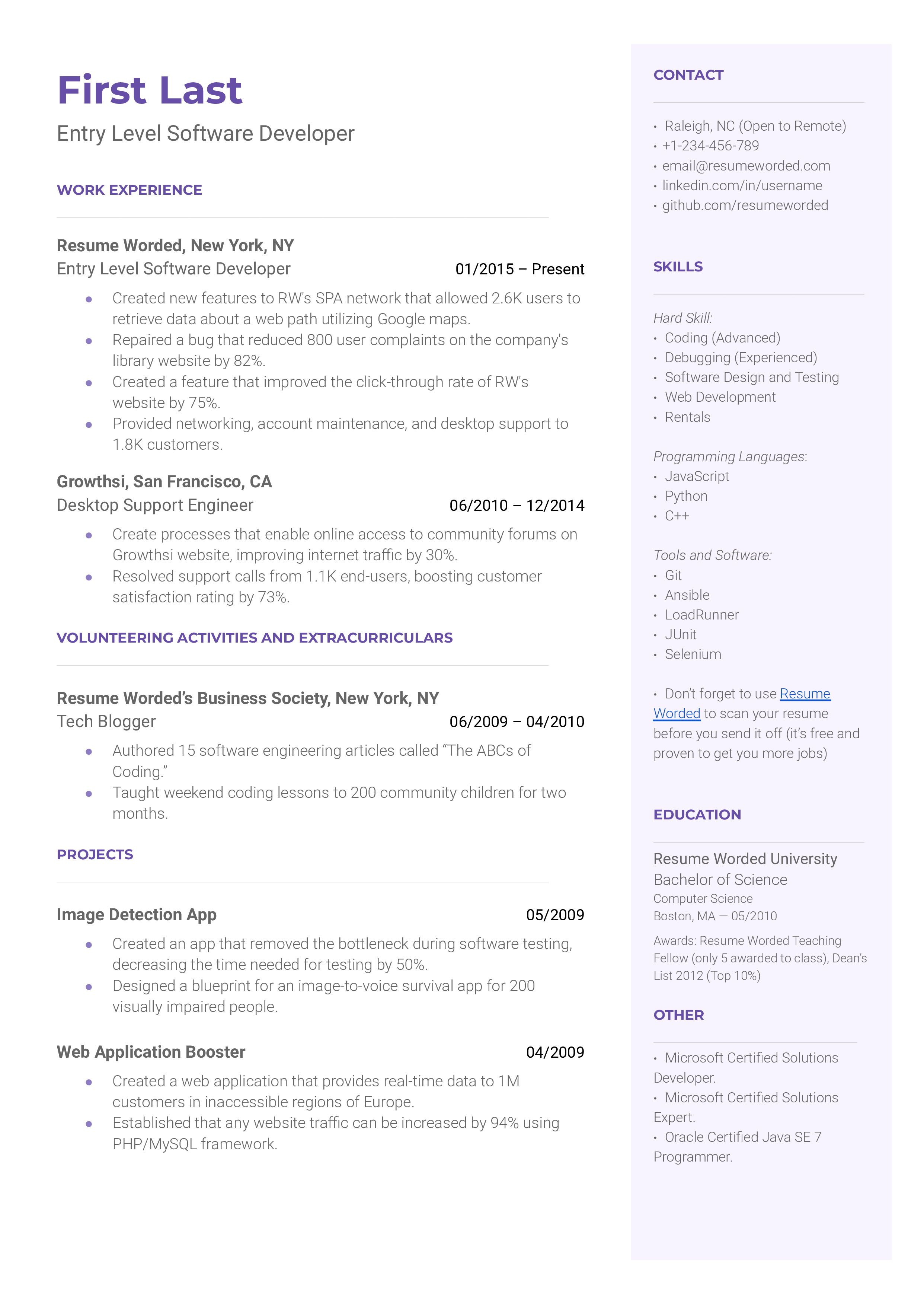
We're just getting the template ready for you, just a second left.
Recruiter Insight: Why this resume works in 2022
Tips to help you write your entry level software developer resume in 2024, include software development projects that you’ve done on your own..
As an entry-level software developer, you may not have a lot of industry experience, but that doesn’t mean you can’t apply for this role. You can use non-work-related experiences such as volunteering or your software engineering projects. These facets have more value than you may think.
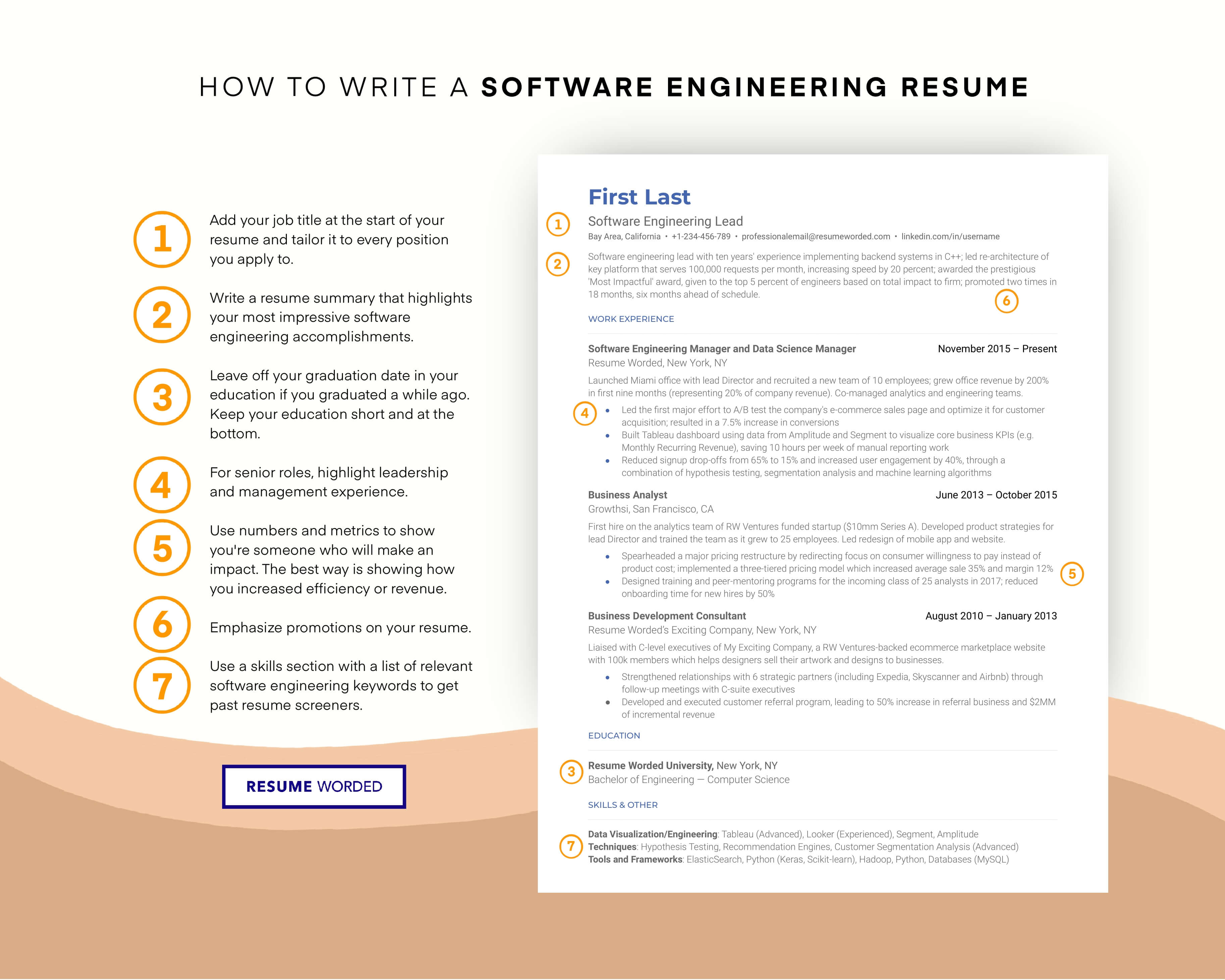
Highlight your transferable skills.
Another great way to enrich your entry-level software developer resume is by leveraging your transferrable skills. These are competencies you may have earned in previous jobs that are also relevant for a particular occupation. In this case, you can mention your organizational skills, graphic design, or logical thinking.
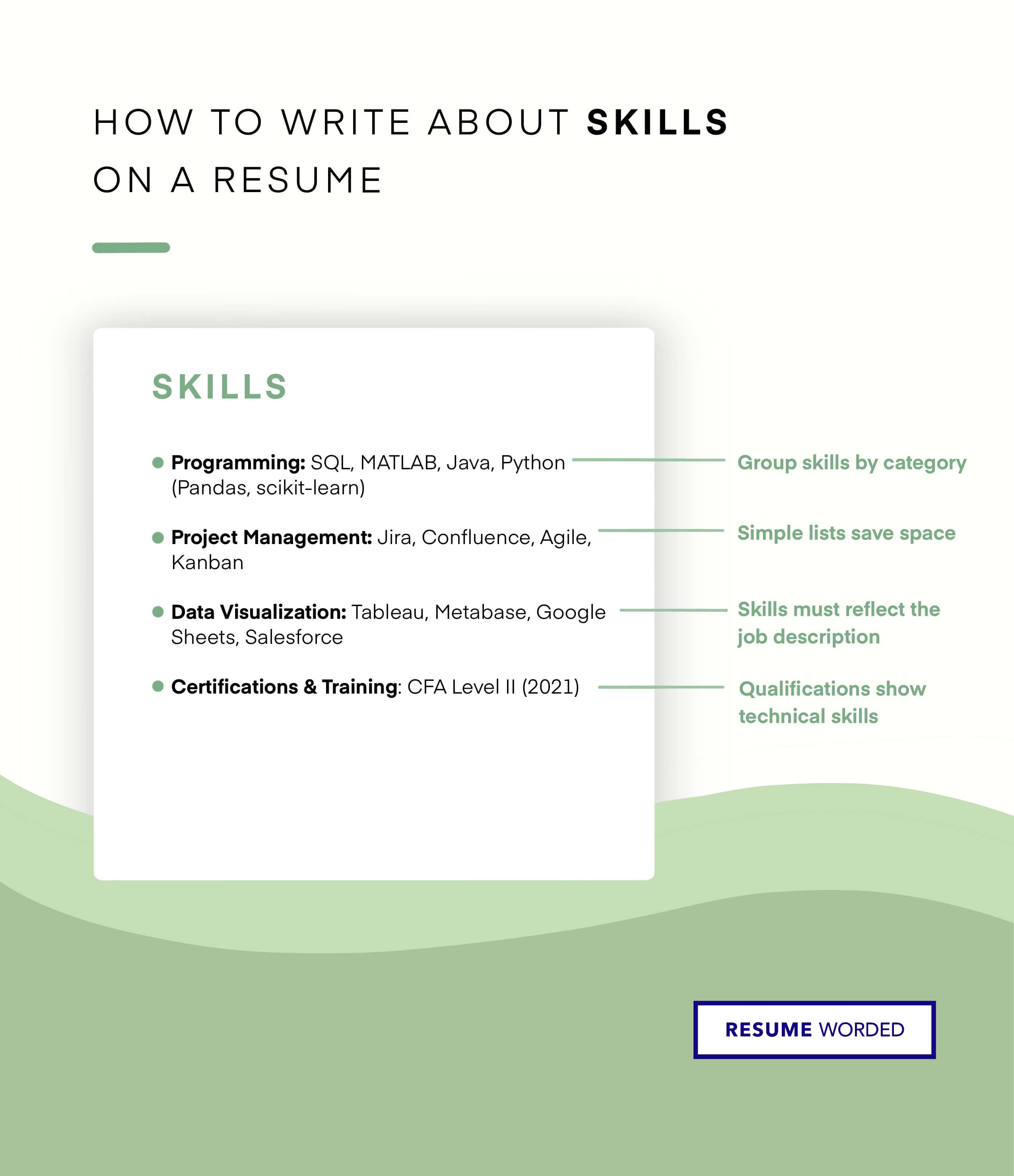
Junior Software Engineer Resume Sample
Associate software developer resume sample, entry level programmer resume sample, software engineering trainee resume sample.
As a government agency, we have spoken to hiring managers at top companies like Google, Microsoft, and Amazon to gather their insights on what makes a strong entry-level software developer resume. Based on their feedback and our own expertise, we have compiled a list of actionable tips to help you craft a resume that will stand out to potential employers in the tech industry.
Highlight your coding projects
Employers want to see evidence of your coding skills and passion for programming. Include a section on your resume showcasing your most impressive coding projects.
- Developed a mobile app using React Native that has over 10,000 downloads and a 4.8-star rating on the App Store
- Created a web scraper using Python that collects and analyzes data from over 50 e-commerce sites, saving the company 20 hours per week in manual data entry
- Built a full-stack web application using Node.js and MongoDB that allows users to create and share custom playlists, with over 500 registered users
When describing your projects, focus on the technologies you used, the problem you solved, and the quantifiable impact of your work.
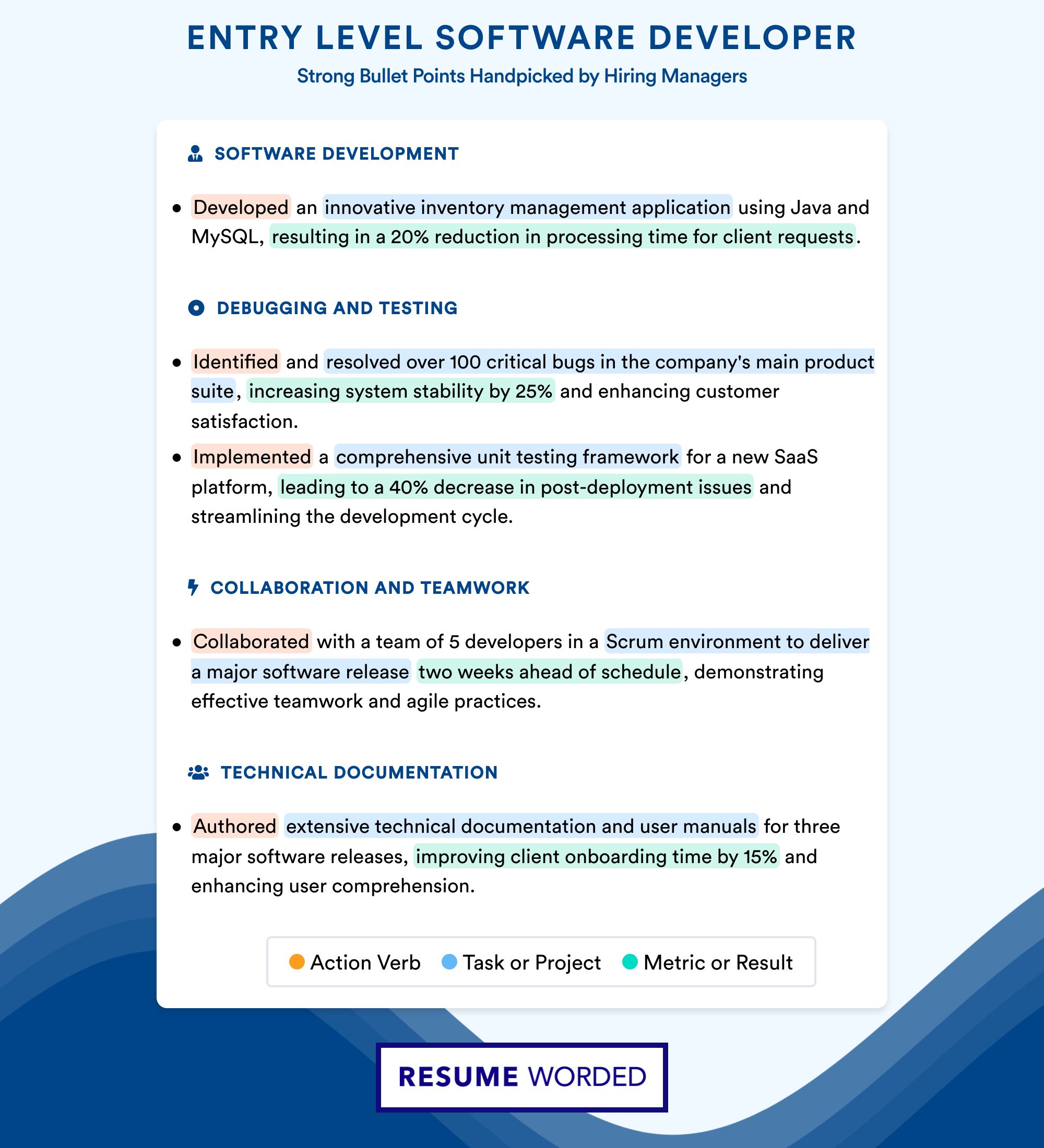
Emphasize your technical skills
As an entry-level software developer, your technical skills are your biggest asset. Make sure to include a comprehensive list of the programming languages, frameworks, and tools you are proficient in.
- Familiar with various programming languages
- Knowledge of web development technologies
Instead of using vague descriptions, be specific about your skills and level of expertise:
- Proficient in Java, Python, and C++
- Experience with React, Angular, and Vue.js frameworks
- Skilled in using Git for version control and collaboration
Show your problem-solving abilities
Employers are looking for software developers who can think critically and solve complex problems. Use your resume to showcase your problem-solving skills through specific examples.
- Debugged and resolved a critical issue in the company's e-commerce platform, resulting in a 15% increase in sales
- Developed an algorithm that optimized the company's inventory management system, reducing waste by 20%
- Collaborated with cross-functional teams to identify and address performance bottlenecks, improving page load times by 50%
When describing your problem-solving experiences, focus on the challenge you faced, the actions you took, and the measurable results of your efforts.

Include relevant coursework and certifications
As an entry-level candidate, your education and certifications can help you stand out to potential employers. Include relevant coursework, projects, and certifications on your resume.
- Completed a capstone project on machine learning, developing a model that predicted customer churn with 90% accuracy
- Earned a certification in AWS Solutions Architecture, demonstrating knowledge of cloud computing best practices
- Participated in a hackathon, building a web app that won first place and a $5,000 prize
When listing your education and certifications, focus on the most relevant and impressive achievements that showcase your skills and potential as a software developer.
Tailor your resume to the job description
One of the biggest mistakes entry-level candidates make is sending a generic resume to every job application. Instead, tailor your resume to the specific job description and company.
Objective: To obtain a challenging position as a software developer where I can utilize my skills and knowledge to contribute to the success of the company.
Instead of using a generic objective statement, customize your resume summary to the specific job:
Recent computer science graduate with experience in full-stack web development using React and Node.js. Seeking to leverage my skills in Agile development and test-driven development to contribute to [Company Name]'s mission of building innovative software solutions.
By tailoring your resume to the job description, you demonstrate your fit for the role and increase your chances of getting noticed by the hiring manager.
Use metrics to quantify your impact
Whenever possible, use metrics to quantify the impact of your work. This helps employers understand the value you can bring to their organization.
- Developed a new feature for the company's mobile app
- Improved the performance of the company's website
Instead, use specific metrics to demonstrate your impact:
- Developed a new feature for the company's mobile app that increased user engagement by 30% and reduced churn by 15%
- Optimized the company's website, reducing page load times by 40% and increasing conversions by 20%
By using metrics, you provide concrete evidence of your abilities and make a stronger case for why an employer should hire you.
Writing Your Entry Level Software Developer Resume: Section By Section
summary.
A resume summary, also known as a professional summary or career summary, is an optional section that can be a powerful addition to your resume. It provides a brief overview of your most relevant qualifications, skills, and experiences, tailored to the specific job you're applying for. While a summary is not strictly necessary, it can be particularly useful if you're making a career change or have a diverse background that may not be immediately apparent from your work history alone.
It's important to note that a resume objective, which focuses on your career goals rather than your qualifications, is generally not recommended. Employers are more interested in what you can bring to the table, not what you hope to gain from the position. Instead, use the summary to showcase your value and make a strong case for why you're the best candidate for the job.
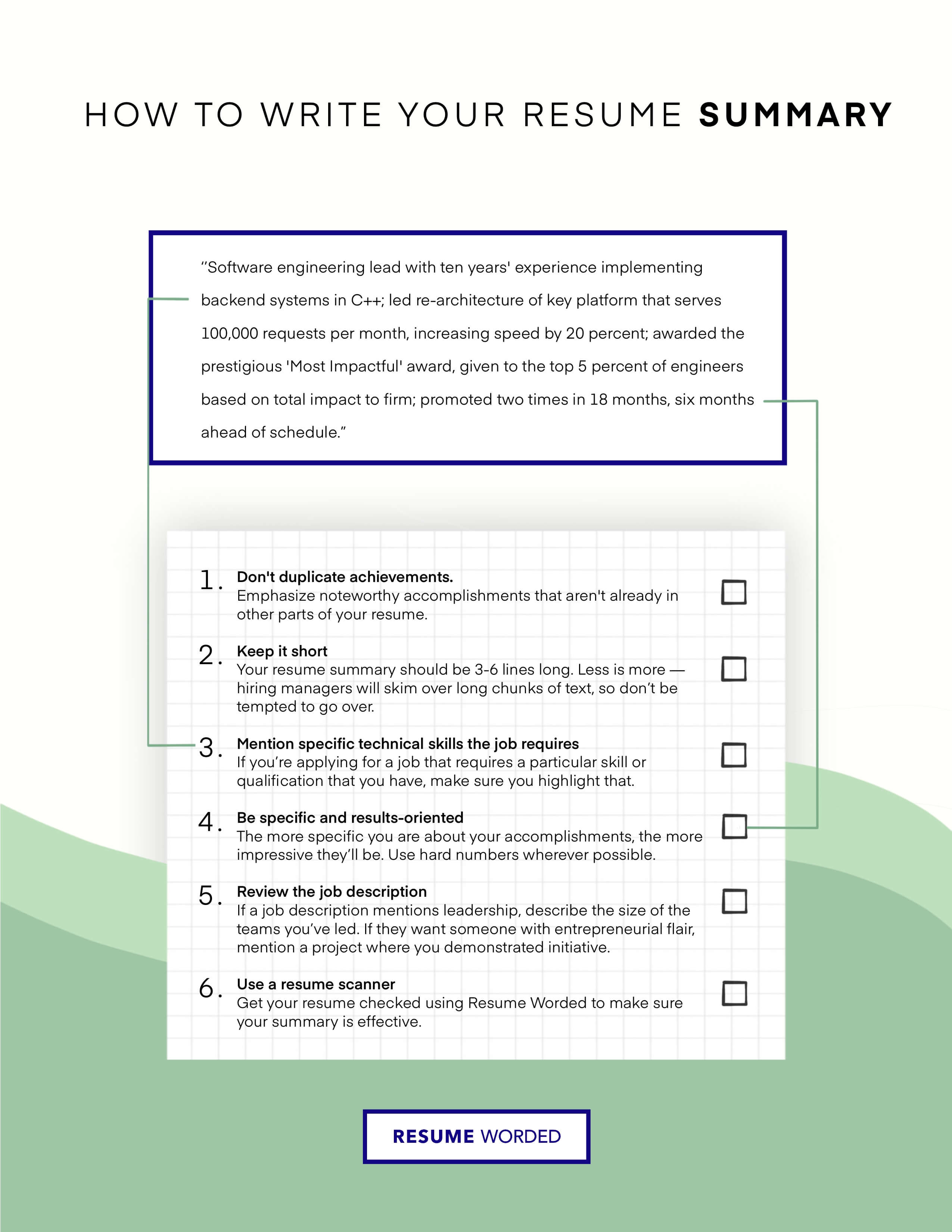
To learn how to write an effective resume summary for your Entry Level Software Developer resume, or figure out if you need one, please read Entry Level Software Developer Resume Summary Examples , or Entry Level Software Developer Resume Objective Examples .
1. Tailor your summary to the software developer role
When writing your summary for an entry-level software developer position, it's crucial to align your qualifications with the requirements of the role. Research the company and the specific position to identify the key skills, programming languages, and experiences they are looking for.
For example, if the job description emphasizes proficiency in Python and experience with web development, your summary might look like this:
Recent computer science graduate with a strong foundation in Python and web development. Developed and deployed a full-stack e-commerce application using Django and React during a senior capstone project. Seeking to leverage my skills and passion for coding to contribute to innovative software solutions as an entry-level developer.
Avoid generic summaries that could apply to any job, like:
Hardworking and motivated individual seeking an opportunity to grow and learn in a challenging environment. Strong problem-solving skills and ability to work well in a team.
2. Highlight relevant projects and technical skills
As an entry-level software developer, you may not have extensive professional experience. However, you can still showcase your skills and potential by highlighting relevant projects, coursework, and technical abilities in your summary.
Mention specific programming languages, frameworks, and tools you have worked with, and describe how you applied them in projects. For example:
- Proficient in Java, C++, and SQL, with experience in Agile development methodologies
- Developed a mobile app using Android Studio and Java, utilizing RESTful APIs and Firebase for backend functionality
Avoid simply listing generic skills or using buzzwords without context, such as:
- Fast learner
- Detail-oriented
- Team player
Instead, demonstrate these qualities through your projects and experiences.
Experience
The work experience section is the heart of your resume. It's where you highlight your most relevant and impactful professional experiences. As an entry level software developer, you may not have extensive work history in the field. However, there are still ways to showcase your skills and potential through internships, projects, and other relevant experiences.
In this section, we'll provide tips on how to effectively write your work experience section to stand out to hiring managers and land your first software development job.
1. Use strong action verbs to highlight your coding achievements
When describing your work experiences, use powerful action verbs that demonstrate your coding skills and impact. This helps hiring managers quickly understand your capabilities and value.
Examples of weak, generic descriptions:
- Worked on a team to build a mobile app
- Helped with debugging and testing
Instead, use strong, specific verbs:
- Developed a React Native mobile app that increased user engagement by 30%
- Debugged and resolved 50+ issues to ensure seamless app performance

2. Quantify your coding impact with metrics and numbers
Whenever possible, quantify your achievements with specific metrics or numbers. This helps hiring managers understand the scope and impact of your work.
Examples of quantified bullet points:
- Reduced page load time by 40% by implementing lazy loading and code optimization techniques
- Collaborated with a team of 5 developers to ship a SaaS product with 10,000 active users
- Implemented a machine learning algorithm that improved predictive accuracy by 20%
If you don't have access to specific metrics, you can still provide numbers to give a sense of scale, like the size of the codebase, number of features implemented, etc.
Lacking metrics for your resume? Try to estimate the impact and results of your work. What was the outcome of the projects you contributed to? Faster load times, more users, revenue generated? Even ballpark percentages can be impactful.
3. Showcase relevant tools, languages and frameworks
In the tech industry, hiring managers often look for specific programming languages, tools, and frameworks. Showcase your proficiency by weaving them into your work experience descriptions.
Developed a full-stack web application using React, Node.js, and MongoDB, following agile development methodologies and Git workflow
Focus on including the most relevant and in-demand technologies for the specific job you're applying to. Analyze the job description and tailor your resume accordingly.
Not sure if your resume highlights the right programming skills? Try our Targeted Resume tool. It analyzes your resume against a job description and provides personalized feedback on which technical keywords and skills to include.
4. Feature independent projects and open source contributions
As an entry level developer, personal projects and open source contributions can be a great way to demonstrate your coding skills and passion. Include them in your work experience section, especially if they are substantial and relevant.
Example of featuring an independent project:
- Developed a mobile game using Unity and C# with 10,000+ downloads on Google Play Store
- Built and maintained an open source npm package for data visualization with 500+ stars on GitHub
Treat your independent projects with the same level of detail and impact-focused descriptions as your professional experiences. Highlight the technologies used, challenges overcome, and results achieved.
5. Highlight your career progression and leadership
If you have multiple experiences or internships, showcase your career growth and progression. Hiring managers value candidates who have taken on increasing responsibilities and leadership roles.
Software Engineering Intern, ABC Tech (Summer 2020) - Implemented a new feature for the company's flagship product using Java and Spring Boot - Collaborated with senior developers to improve code quality and performance Software Engineering Intern, ABC Tech (Summer 2021) - Led a team of 3 interns to develop a new internal tool using Python and Django - Presented the project to executive leadership and received praise for the tool's impact on productivity
Even if your promotions or leadership experiences are from non-software development roles, they are still valuable to highlight. Focus on transferable skills like project management, communication, and problem-solving.
Want to ensure your resume effectively showcases your career progression? Our Score My Resume tool instantly analyzes your resume and provides expert feedback on 30+ key criteria, including highlighting promotions and leadership.
Education
The education section of your resume is key for entry level software developer roles. It shows hiring managers that you have the necessary technical knowledge and skills for the job.
Here are the most important things to keep in mind when writing your education section:

1. Put education at the top if you're a recent grad
If you graduated within the last 1-2 years, your education is likely your strongest qualification for entry level software developer jobs. Put it front and center at the top of your resume, just below your summary or objective statement.
For example:
EDUCATION Bachelor of Science in Computer Science University of Texas at Austin Graduated: May 2022 GPA: 3.8
2. Include relevant coursework and projects
As a recent grad, you may not have much professional experience yet to showcase on your resume. Highlight relevant coursework, capstone projects, or academic achievements in your education section to demonstrate your skills.
Coursework and projects to potentially include for entry level software developers:
- Data Structures and Algorithms
- Web Development
- Senior Capstone Project: Built an e-commerce web app using React and Node.js
3. List programming languages and technical skills
Software development job descriptions often specify the coding languages and technical skills required. Use your education section to show you have expertise in these key areas.
Include programming proficiencies like:
- JavaScript/TypeScript
Avoid listing basic computer skills like Microsoft Word or Excel, unless they are mentioned in the job posting. Focus on technical proficiencies.
4. Keep it short if you're experienced
If you are a senior software engineer with many years of experience, your education section should be brief. Hiring managers are much more interested in your work accomplishments than your degree from 15 years ago.
Here's an example of what not to do:
EDUCATION Master of Science in Software Engineering Carnegie Mellon University, Pittsburgh, PA Graduated: May 2005 Relevant Coursework: Data Structures, Web App Development, Software Testing GPA: 3.9 Bachelor of Science in Computer Science University of Pennsylvania, Philadelphia, PA Graduated: May 2003 Relevant Coursework: Algorithms, Databases, Programming Languages GPA: 3.7
Instead, keep it concise like this:
EDUCATION M.S. Software Engineering, Carnegie Mellon University B.S. Computer Science, University of Pennsylvania
Skills
The skills section of your resume is one of the most important parts, especially for entry level software developer positions. Hiring managers and recruiters will scan this section to quickly assess if you have the technical skills and expertise needed for the job.
In this section, we'll cover what to include in your skills section, and how to make it stand out to potential employers.

1. Understand how applicant tracking systems (ATS) work
Before you start writing your skills section, it's important to understand how many companies use Applicant Tracking Systems (ATS) to screen resumes. ATS software scans your resume for specific keywords related to the job posting, and ranks candidates based on how well their resume matches.
This means that if your skills section doesn't include the right keywords, your resume may never make it to a human reviewer. To avoid this, carefully review the job description and make sure to include relevant skills and keywords in your skills section.
2. Focus on technical skills and programming languages
As an entry level software developer, your skills section should focus primarily on your technical skills and programming language proficiencies. Avoid including soft skills like "communication" or "teamwork" in this section, as they are less important for technical roles and can be demonstrated through your work experience instead.
Some key technical skills and programming languages to consider including:
- Programming languages : Java, Python, C++, JavaScript, Ruby
- Web development : HTML, CSS, React, Angular
- Databases : SQL, MySQL, MongoDB
- Tools and frameworks : Git, Agile, Scrum, AWS
3. Use a simple, easy-to-read format
When it comes to formatting your skills section, keep it simple and easy to read. Avoid using complex charts or graphs, and stick to a straightforward list format.
Here's an example of a poorly formatted skills section:
Skills: Java, Python, JavaScript, HTML, CSS, React, Angular, Node.js, Express.js, MongoDB, MySQL, Git, Agile, Scrum, AWS, jQuery, Bootstrap, Typescript, C++, Ruby on Rails, PHP, WordPress, Drupal, Joomla, Magento, Shopify, iOS, Android, Kotlin, Swift, Objective-C, Flutter, React Native, Xamarin, Unity, C#, .NET, ASP.NET, Visual Studio, SQL Server, Azure, DevOps, Docker, Kubernetes
While this skills section includes a lot of relevant keywords, it's overwhelming and difficult to read. Instead, try grouping your skills into categories and limiting the number of skills you include:
Skills: Programming Languages: Java, Python, JavaScript Web Development: HTML, CSS, React, Node.js Databases: MySQL, MongoDB Tools & Frameworks: Git, Agile, AWS
4. Tailor your skills to the job description
One of the biggest mistakes entry level candidates make is using the same generic resume to apply for every job. Instead, you should tailor your resume and skills section to each specific job you apply for.
Start by carefully reading through the job description and noting any specific skills, tools, or keywords that are mentioned. Then, make sure to include those same skills and keywords in your own skills section (assuming you actually have those skills).
For example, if a job description mentions that they are looking for someone with experience in React and Node.js, your skills section might look like this:
Skills: Programming Languages: JavaScript, Java, Python Web Development: React, Node.js, HTML, CSS Databases: MySQL, MongoDB
By tailoring your skills section to the specific job, you'll have a much better chance of getting past any ATS filters and catching the attention of the hiring manager.
Skills For Entry Level Software Developer Resumes
Here are examples of popular skills from Entry Level Software Developer job descriptions that you can include on your resume.
- Cloud Computing
- Software Architecture
- Web Services
- Service-Oriented Architecture (SOA)
- Software as a Service (SaaS)
- Enterprise Software
- Agile Methodologies
- Amazon Web Services (AWS)
Skills Word Cloud For Entry Level Software Developer Resumes
This word cloud highlights the important keywords that appear on Entry Level Software Developer job descriptions and resumes. The bigger the word, the more frequently it appears on job postings, and the more likely you should include it in your resume.
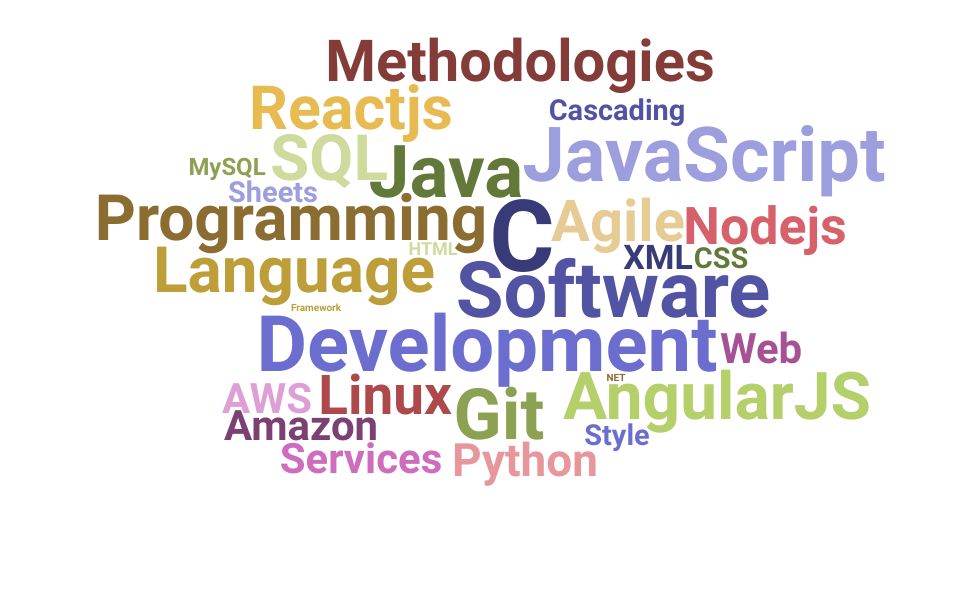
How to use these skills?
Similar resume templates, cloud developer.
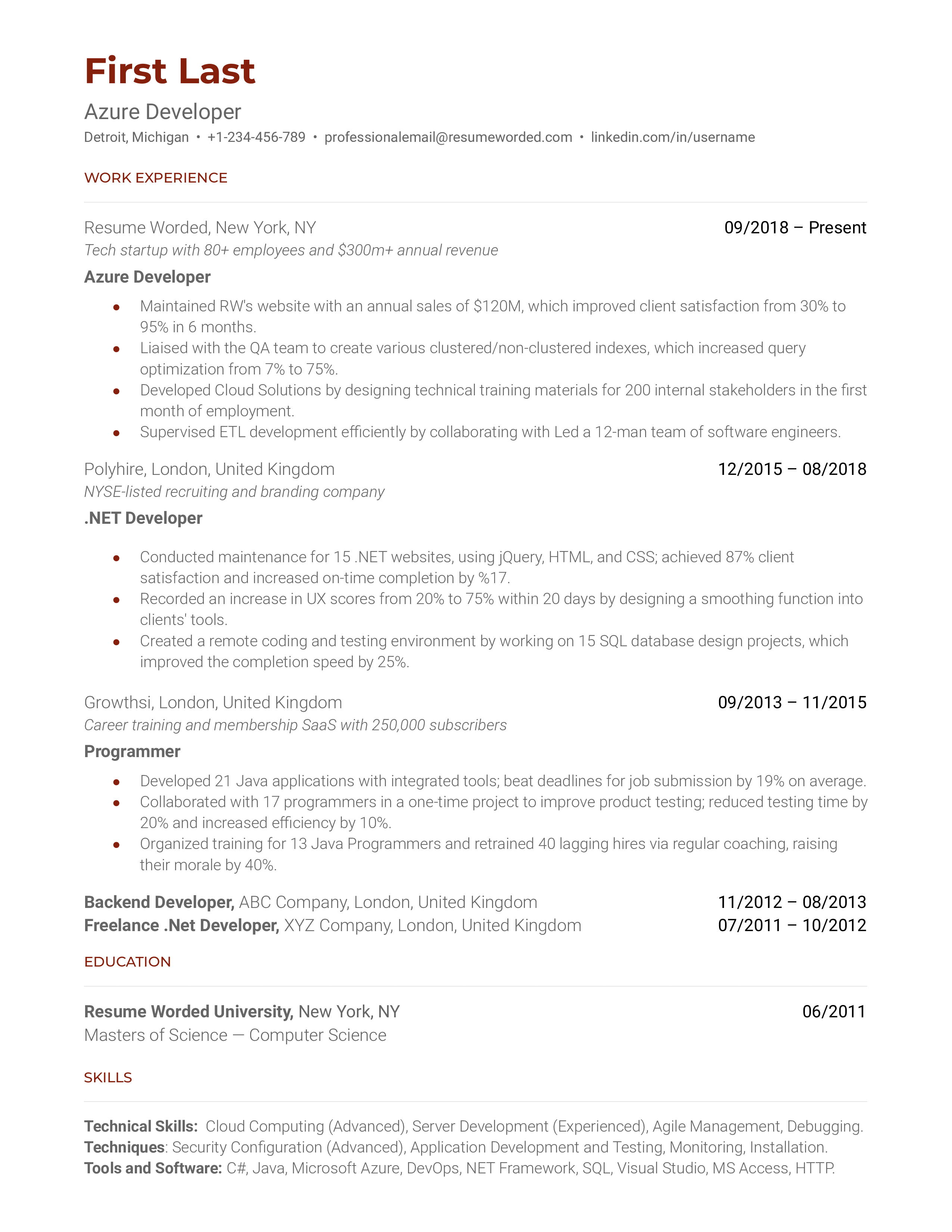
Project Leader
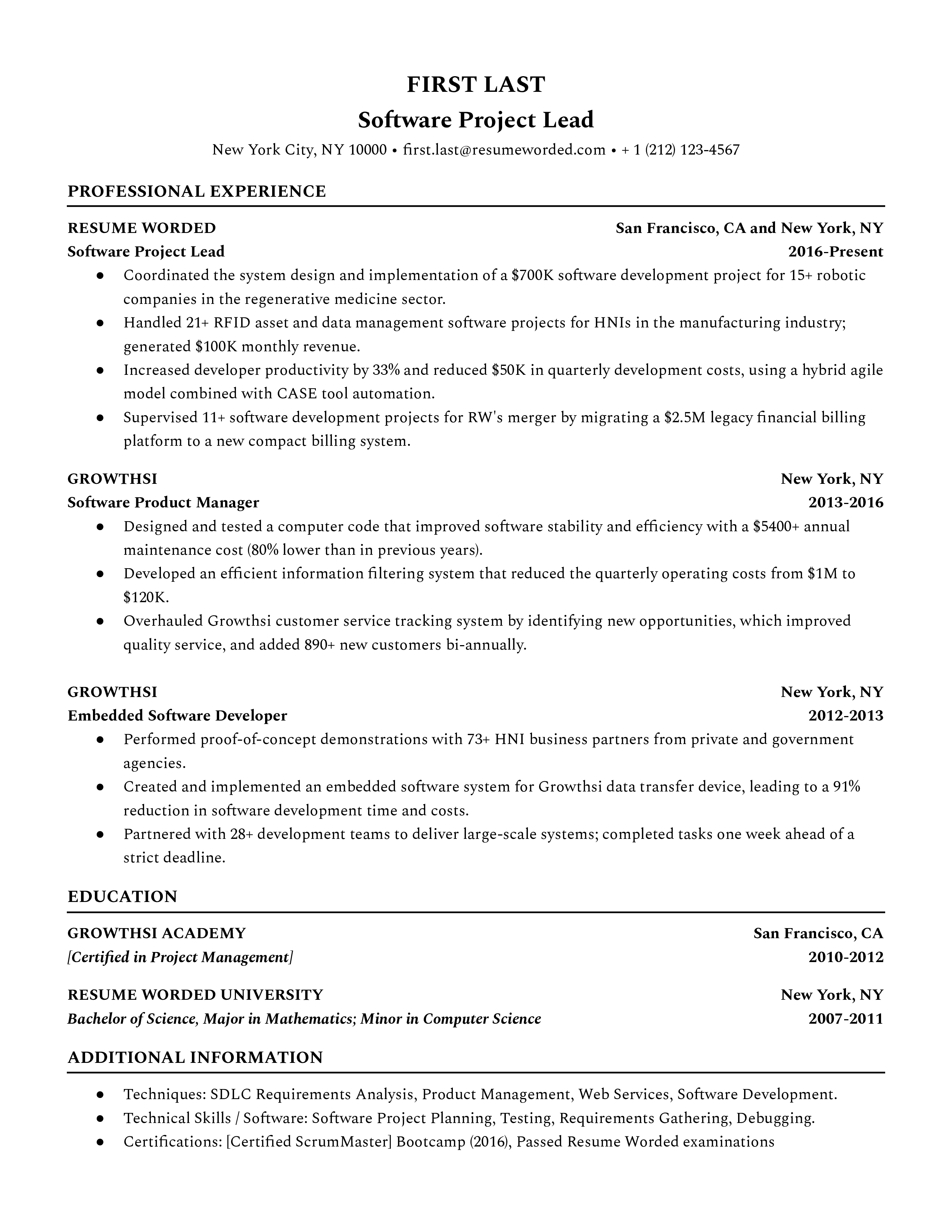
Project Manager
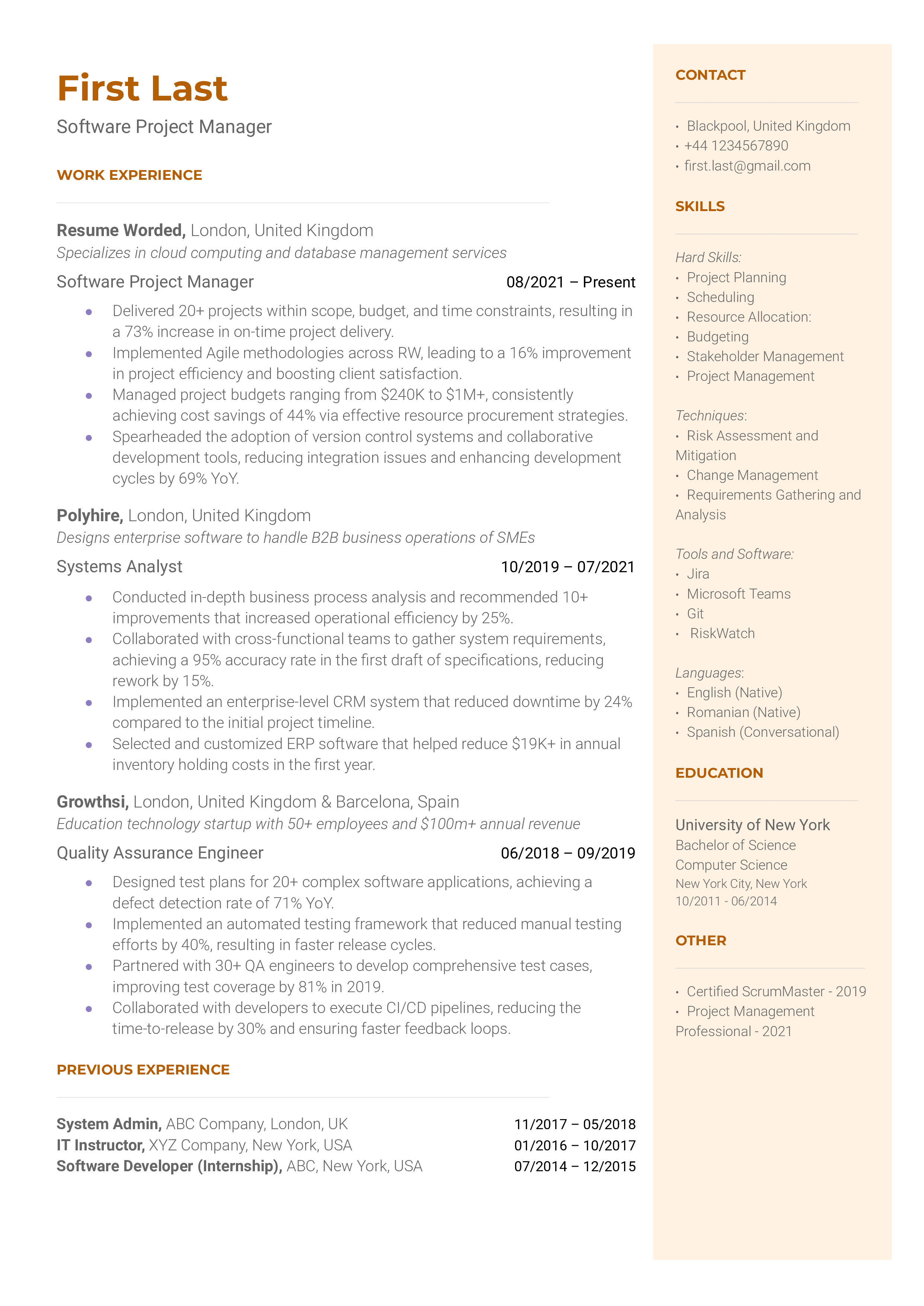
- Planning Engineer Resume Guide
- Node.js Resume Guide
- C, C++, and C# Developer Resume Guide
- Full Stack Developer Resume Guide
- Manufacturing Engineer Resume Guide
Resume Guide: Detailed Insights From Recruiters
- Software Developer Resume Guide & Examples for 2022
Improve your Entry Level Software Developer resume, instantly.
Use our free resume checker to get expert feedback on your resume. You will:
• Get a resume score compared to other Entry Level Software Developer resumes in your industry.
• Fix all your resume's mistakes.
• Find the Entry Level Software Developer skills your resume is missing.
• Get rid of hidden red flags the hiring managers and resume screeners look for.
It's instant, free and trusted by 1+ million job seekers globally. Get a better resume, guaranteed .
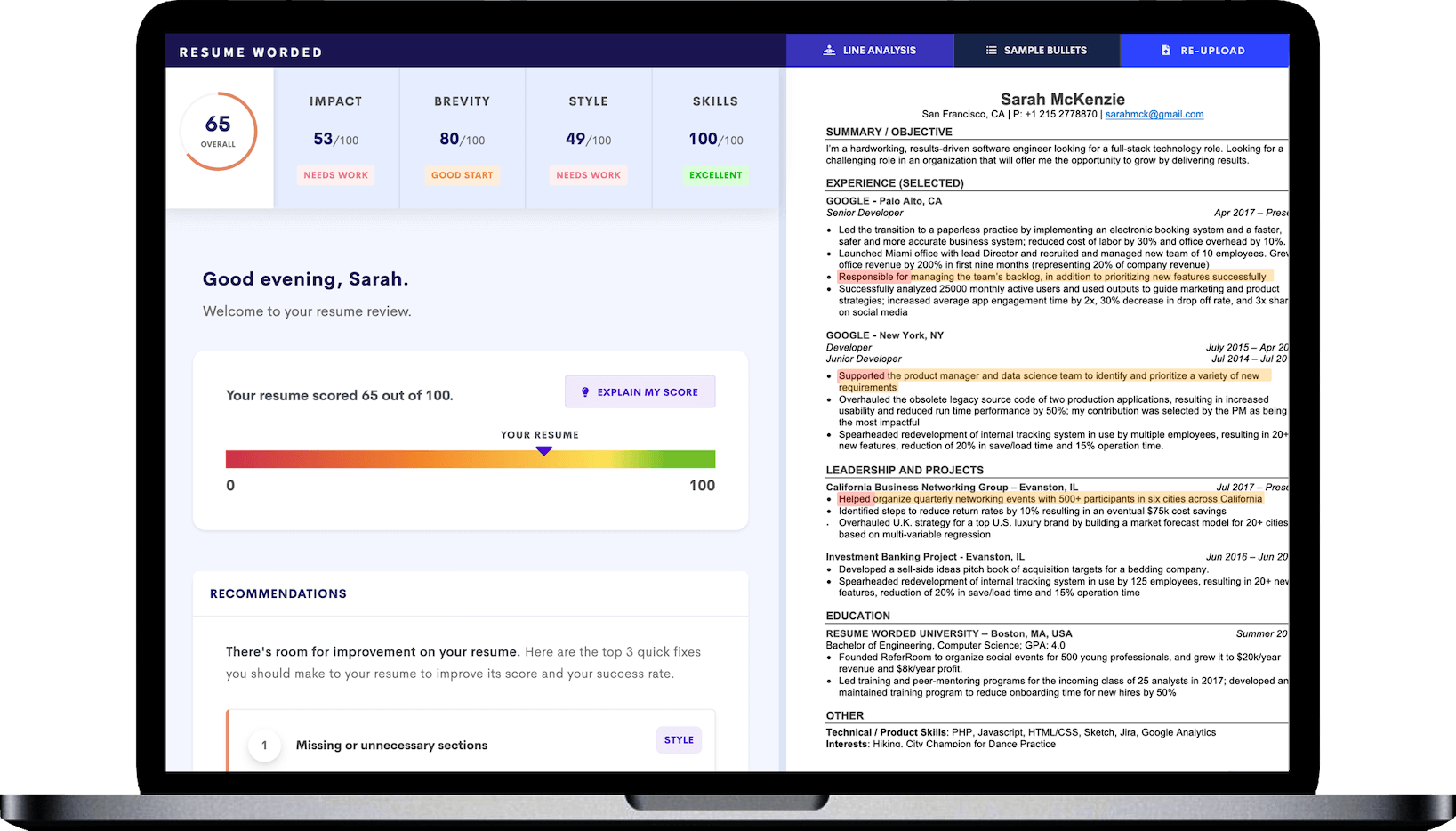
Entry Level Software Developer Resumes
- Template #1: Entry Level Software Developer
- Template #2: Entry Level Software Developer
- Template #3: Junior Software Engineer
- Template #4: Associate Software Developer
- Template #5: Entry Level Programmer
- Template #6: Software Engineering Trainee
- Skills for Entry Level Software Developer Resumes
- Free Entry Level Software Developer Resume Review
- Other Engineering Resumes
- Entry Level Software Developer Interview Guide
- Entry Level Software Developer Sample Cover Letters
- Alternative Careers to a Software Engineer
- All Resumes
- Resume Action Verbs
Download this PDF template.
Creating an account is free and takes five seconds. you'll get access to the pdf version of this resume template., choose an option..
- Have an account? Sign in
E-mail Please enter a valid email address This email address hasn't been signed up yet, or it has already been signed up with Facebook or Google login.
Password Show Your password needs to be between 6 and 50 characters long, and must contain at least 1 letter and 1 number. It looks like your password is incorrect.
Remember me
Forgot your password?
Sign up to get access to Resume Worded's Career Coaching platform in less than 2 minutes
Name Please enter your name correctly
E-mail Remember to use a real email address that you have access to. You will need to confirm your email address before you get access to our features, so please enter it correctly. Please enter a valid email address, or another email address to sign up. We unfortunately can't accept that email domain right now. This email address has already been taken, or you've already signed up via Google or Facebook login. We currently are experiencing a very high server load so Email signup is currently disabled for the next 24 hours. Please sign up with Google or Facebook to continue! We apologize for the inconvenience!
Password Show Your password needs to be between 6 and 50 characters long, and must contain at least 1 letter and 1 number.
Receive resume templates, real resume samples, and updates monthly via email
By continuing, you agree to our Terms and Conditions and Privacy Policy .
Lost your password? Please enter the email address you used when you signed up. We'll send you a link to create a new password.
E-mail This email address either hasn't been signed up yet, or you signed up with Facebook or Google. This email address doesn't look valid.
Back to log-in
These professional templates are optimized to beat resume screeners (i.e. the Applicant Tracking System). You can download the templates in Word, Google Docs, or PDF. For free (limited time).
access samples from top resumes, get inspired by real bullet points that helped candidates get into top companies., get a resume score., find out how effective your resume really is. you'll get access to our confidential resume review tool which will tell you how recruiters see your resume..

Writing an effective resume has never been easier .
Upgrade to resume worded pro to unlock your full resume review., get this resume template (+ 12 others), plus proven bullet points., for a small one-time fee, you'll get everything you need to write a winning resume in your industry., here's what you'll get:.
- 📄 Get the editable resume template in Google Docs + Word . Plus, you'll also get all 12 other templates .
- ✍️ Get sample bullet points that worked for others in your industry . Copy proven lines and tailor them to your resume.
- 🎯 Optimized to pass all resume screeners (i.e. ATS) . All templates have been professionally designed by recruiters and 100% readable by ATS.
Buy now. Instant delivery via email.
instant access. one-time only., what's your email address.

I had a clear uptick in responses after using your template. I got many compliments on it from senior hiring staff, and my resume scored way higher when I ran it through ATS resume scanners because it was more readable. Thank you!

Thank you for the checklist! I realized I was making so many mistakes on my resume that I've now fixed. I'm much more confident in my resume now.


Build my resume
- Build a better resume in minutes
- Resume examples
- 2,000+ examples that work in 2024
- Resume templates
- Free templates for all levels
- Cover letters
- Cover letter generator
- It's like magic, we promise
- Cover letter examples
- Free downloads in Word & Docs
5 Entry-Level Software Engineer Resume Samples in 2025
Entry-Level Software Engineer

Best for senior and mid-level candidates
There’s plenty of room in our elegant resume template to add your professional experience while impressing recruiters with a sleek design.
Resume Builder
Like this template? Customize this resume and make it your own with the help of our Al-powered suggestions, accent colors, and modern fonts.
- Entry-Level (EL) Software Engineer Resume
- Formal EL Software Engineer Resume
- Elegant EL Software Engineer Resume
- Standout EL Software Engineer Resume
- Professional EL Software Engineer Resume
- Skills & Work Experience
Trust us when we tell you that after you get your first software engineer job, all your other job searches will be much easier.
Companies seem to want software engineers with experience for entry-level roles. But how do you get that experience without experience? It’s an infinite loop.
We’ve helped thousands of developers break into the industry, and our five entry-level software engineer resume templates and the following Q&A are a great place to get started on building a resume and making a cover letter .
Entry-Level Software Engineer Resume
or download as PDF
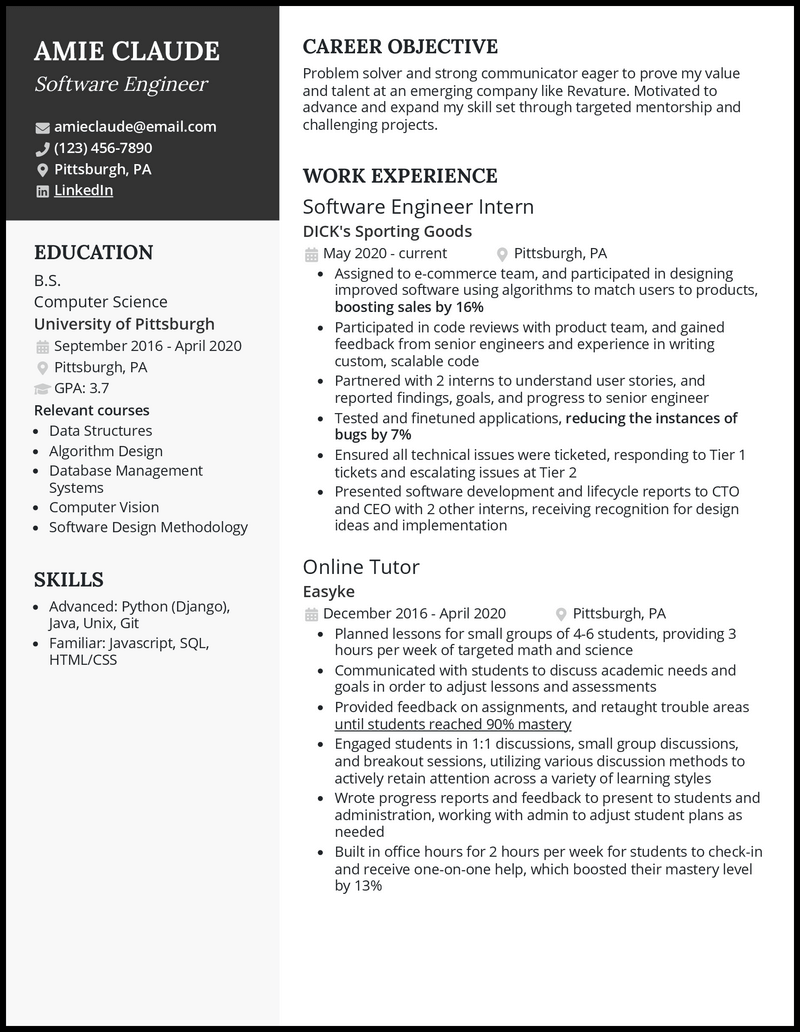
Formal Entry-Level Software Engineer Resume
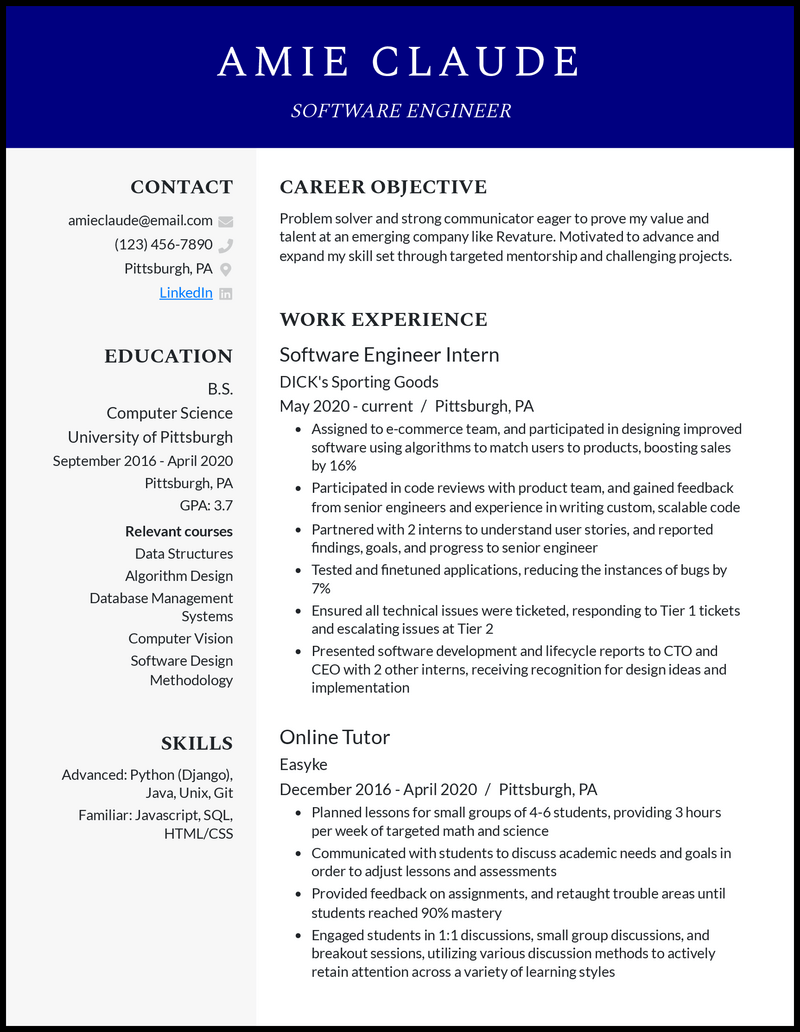
Elegant Entry-Level Software Engineer Resume

Standout Entry-Level Software Engineer Resume

Professional Entry-Level Software Engineer Resume

Related resume examples
- Senior software engineer
- Associate software engineer
- Embedded software engineer
- Software integration engineer
- Software engineer
What Matters To Recruiters: Your Skills & Experience
You have one goal with your resume, to convince the recruiter you know how to code and are able to learn to do it better. Your “skills” and “work experience” sections are the places to accomplish that goal.
The temptation for entry-level developers is to list any and every programming language and library they’ve ever heard of.
Bad idea: recruiters want to see that you’ve focused less on the specific tools and more about applying those tools to become a better developer.
9 Top Entry Level Software Engineer Skills
- Javascript (Angular)
Sample Entry Level Software Engineer Work Experience
As a new software engineer, any relevant coding experience should be put on your resume.
Did you build a perosnal web app to track your runs? Do a coding project for class? Build a website for your club at school?
The goal with your experience is to convince the recruiter you’ll have an impact in the role they’re hiring for. Nothing does that better than numbers.
Here are a few samples:
- Assigned to e-commerce team, and participated in designing improved software using algorithms to match users to products, boosting sales by 16%
- Built a full-stack web app to allow users to simulate and visualize outcomes of poker hands against opponents of different play styles using open source cards.js on the front-end
- Using Selenium I built out a unit testing infrastructure for a client application that reduced the number of bugs reported by the client by 11% month over month
- Built internal tool using NodeJS and Pupeteer.js to automate QA and monitoring of donor-facing web app, which improved CTR by 3%
Top 5 Tips for Your Entry Level Software Engineer Resume
- As great as your teen jobs were, when you’re fresh out of school or a coding boot camp, your education might be your biggest asset! That’s okay and completely expected at this stage of your career. Really put it forward and include relevant programming classes you took as well.
- No getting around it, if you want a job as a programmer you need to show that you can program. You need to have some projects you can point to to say “I built that.” If you don’t have any yet, don’t stress! You can always start working on a project.
- If you have extra space on your resume, you can include a few extra sections. Hobbies and interests , a career objective, activities (like clubs and memberships). If you have a hobby relevant to the company/ developer role you’re applying to, even better.
- I’ve seen software engineer resumes with 50 skills listed on them. Listing this many skills just screams “I’m not an expert in any of these so I’m playing a volume game.” Focus on the languages/ frameworks you know best.
- People tend to feel sheepish about including non-relevant work experience on their developer resume. Showing you have work experience (even if not programming) is strongly preferred by employers to no work experience at all!
Frequently Asked Questions
- Make it easy to read for a human. The big, bad, scary ATS myth largely comes from companies trying to sell you resume software (we’re also trying to sell you our premium tools, too, but we’re honest about it—and our resume templates are ATS-friendly to boot). Focus on making it pleasurable to read for a human first and foremost.
- If you got it, flaunt it! Your Github is a great way to demonstrate your knowledge and capabilities when you’re looking for your first developer job. What better way to showcase yourself than through your code?
- In short, no. Only include a career objective if you’re going to customize it for every company you apply. Companies love to read about themselves, what can I say?


IMAGES
COMMENTS
Aug 15, 2024 · You can use this entry-level software developer resume as a framework to help you write your own: [Full Name] [Phone number] | [Professional email address] | [City, State] | [Professional website] Professional Summary [Brief summary that mentions your core competencies, work experience and career achievements] Education [Degree earned ...
Many resume templates include a photo because it looks nice in a layout—but it's definitely not required, or even common, for a software developer resume. This one is actually optional, but I advise against it for a couple of reasons: at best, it doesn't provide any necessary information (what you look like should not influence whether you ...
Feb 14, 2022 · Your resume for an entry-level Software Developer position is a very important document that creates your first impression on the prospective employer. Hiring managers receive lots of resumes for a Software Developer job and promptly scan resumes ahead of moving on to the next one.
Dec 11, 2024 · Starting as an entry-level software developer can be challenging. This article provides resume examples and advice to help you create a strong application. Learn what skills to highlight, the best formats, and how to catch a hiring manager's attention. Start your career in software development with the right resume.
Entry Level Software Developer Resume Sample. An entry-level software developer is a great role for gaining experience in the industry. You will be part of the development team by doing junior-level tasks such as coding or designing. This experience will help you enrich your toolkit and learn more about software development in the field.
Jun 26, 2024 · How do I make my entry level software engineer resume ATS friendly? Make it easy to read for a human. The big, bad, scary ATS myth largely comes from companies trying to sell you resume software (we’re also trying to sell you our premium tools, too, but we’re honest about it—and our resume templates are ATS-friendly to boot). Focus on ...